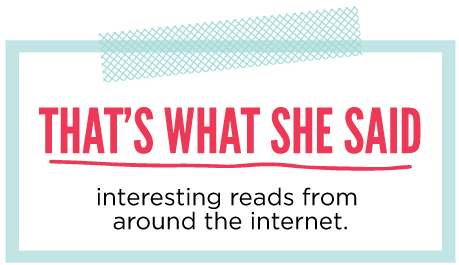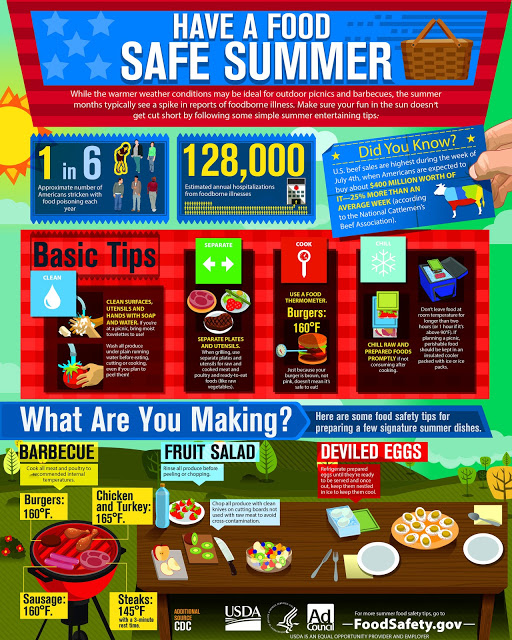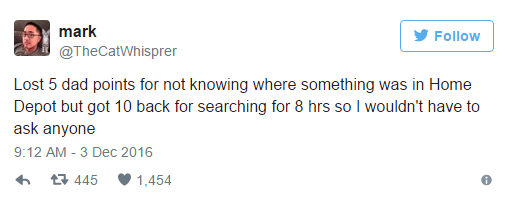Here are some things I read this week that made me think. (These are just snippets – click on the title to read the whole thing.)
10 Things That Changed Me After the Death of a Parent from Lisa via InspireMore
“When you see your friends or even strangers with their mom or dad, you will sometimes be jealous. Envious of the lunch date they have. Downright pissed that your mom can’t plan your baby shower. Big life events are never ever the same again.
Relationship and life strategy coach Lisa Schmidt lost her parents and wrote a powerful tribute to what that truly feels like. She tells of how it’s affected her in the long run and in every day life. She also tells us positive thoughts she still takes away from losing her parents. Her vulnerable story and the wisdom within it are truly inspiring.”
Freeze the miso, rinse the chicken? Test your food-safety knowledge. from Bonnie with the Washington Post
“The FoodKeeper app helps you understand food and beverages storage. It will help you maximize the freshness and quality of items. By doing so you will be able to keep items fresh longer than if they were not stored properly. It was developed by the USDA’s Food Safety and Inspection Service, with Cornell University and the Food Marketing Institute.”
See how you do on the Washington Post’s quiz. I got 8/9.
Psychologists say your drunk personality has a lot in common with your sober self from Cassie with Quartz
People often think that their personalities change when they’re drunk, and they might even feel very different. But according to new research from the University of Missouri published in May in the journal Clinical Psychological Science, most of that doesn’t show—even when people are closely watched in test conditions by a small battery of trained observers.
12 Hilarious Tweets From The Funny Dads Of Twitter from Valerie with Scary Mommy
“Somewhere along the way, the effort involved in entertaining and hosting dinner parties became too much. We could barely keep up with basic tasks of survival, and the thought of adding extra chores to my list of to-dos — extra grocery shopping, extra cleaning, and extra meal preparation — seemed like too much work. So we stopped hosting casual dinner parties. Instead, we meet friends at restaurants and bars. We have date nights alone. And we save entertaining for special occasions, like birthdays and holidays.
Lately, though, I’ve been thinking a lot about those dinner parties of days gone by. I miss them. I miss my friends. I miss the way conversation unfolds when people sit around a table. About a year ago, I heard about Friday Night Meatballs, and a couple months ago I read an article called “5 Rules for Hosting a Crappy Dinner Party (and Seeing Your Friends More Often),” and I thought: Why am I making this so damn hard? Maybe there’s a way to gather together with friends without the hassles? Maybe there’s a way to socialize without spending my kids’ college fund on babysitters? Maybe there’s a way to have a kick-ass time at a half-ass dinner party?”
Why Poor People Stay Poor: Saving money costs money. Period. from Linda via Slate
“It’s amazing what things that are absolute crises for me are simple annoyances for people with money. Anything can make you lose your apartment, because any unexpected problem that pops up, like they do, can set off that Rube Goldberg device…
Here’s the thing: we know the value of money. We work for ours. If we’re at 10 bucks an hour, we earn 83 cents, before taxes, every five minutes. We know exactly what a dollar’s worth; it’s counted in how many more times you have to duck and bend sideways out the drive through window. Or how many floors you can vacuum, or how many boxes you can fill.”
Baby boomers are downsizing — and the kids won’t take the family heirlooms form Beth with The Boston Globe
“For generations, adult children have agreed to take their aging parents’ possessions — whether they wanted them or not. But now, the anti-clutter movement has met the anti-brown-furniture movement, and the combination is sending dining room sets, sterling silver flatware, and knick-knacks straight to thrift stores or the curb.
And feelings are getting hurt, as adult children who are eager to minimize their own belongings — and who may live in small spaces, and entertain less formally than their parents did — are increasingly saying “no thanks” to the family heirlooms.”





